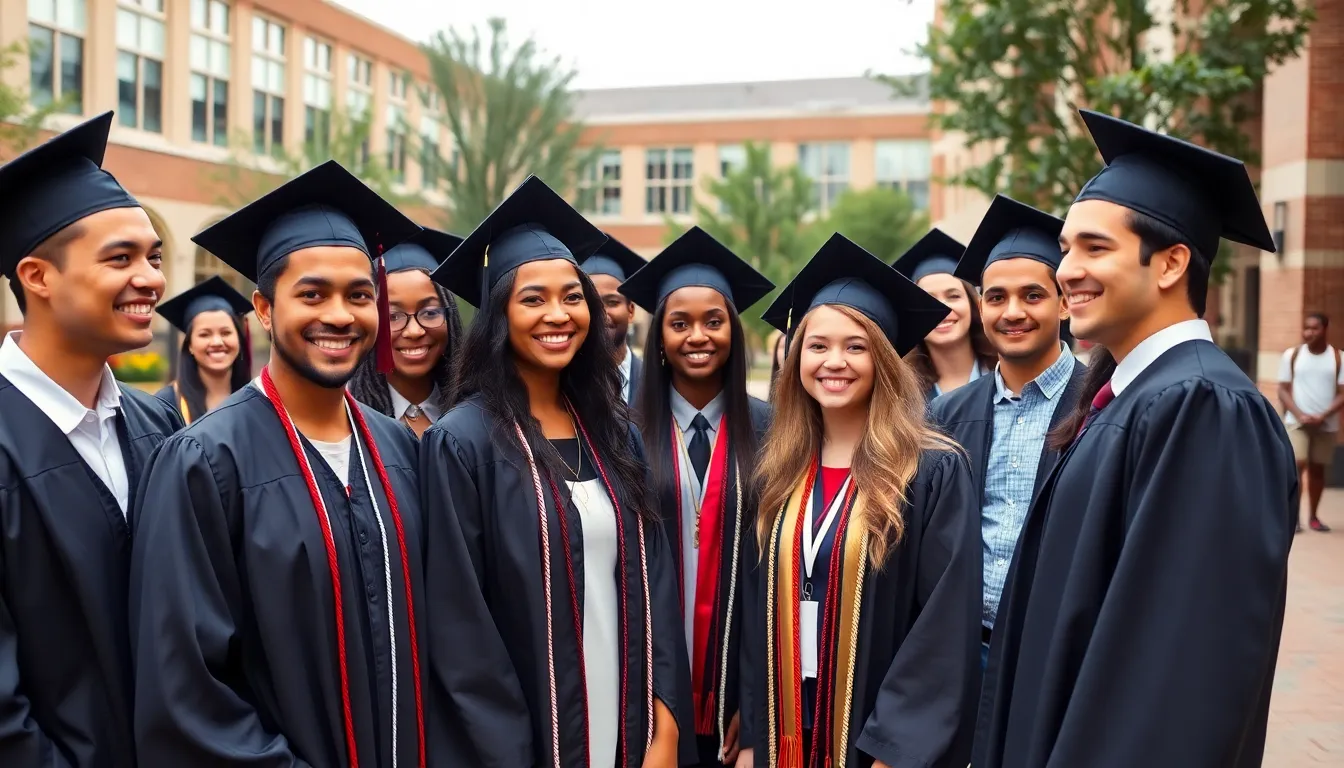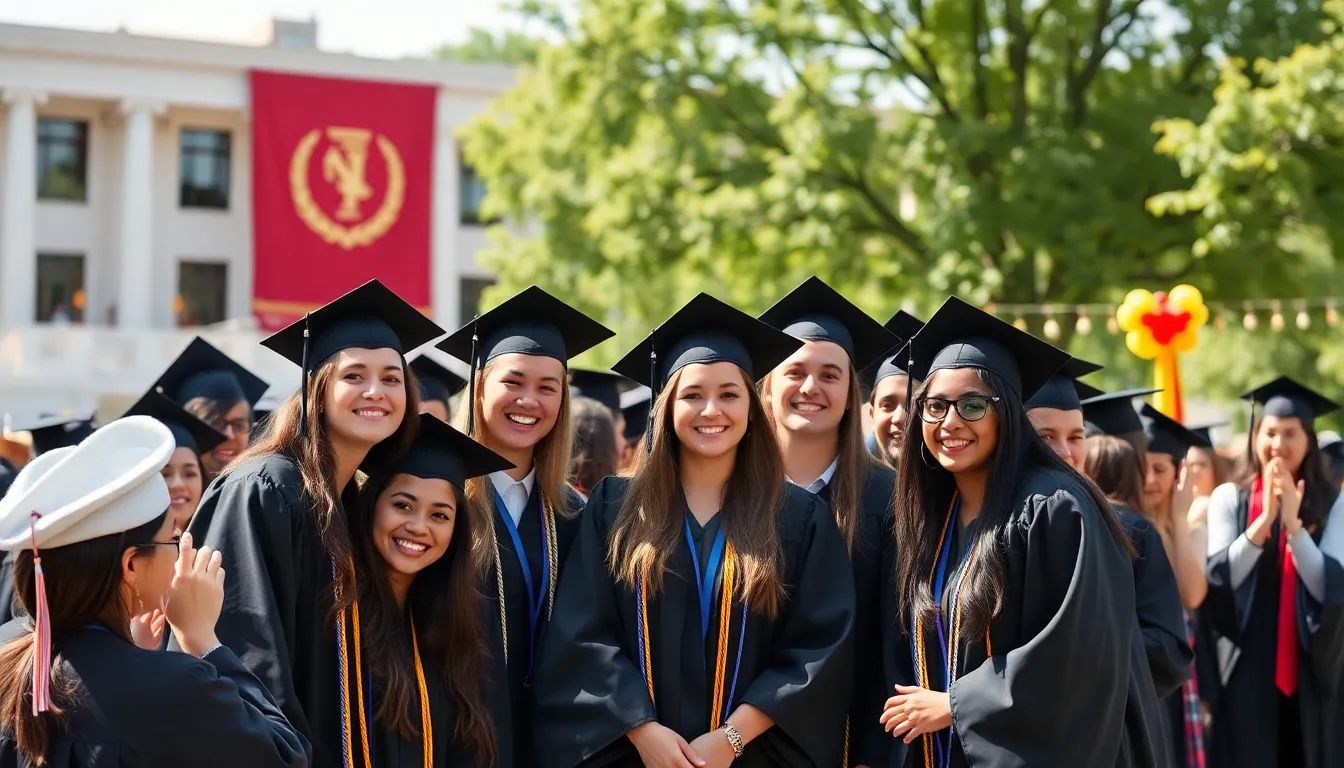Table of Contents
ToggleGraduation day is the moment every student dreams of—the cap, the gown, and that magical walk across the stage. It’s a day filled with pride, joy, and perhaps a little panic about what comes next. After years of late-night cramming and questionable cafeteria food choices, the finish line is finally in sight. But let’s face it, while the diploma is a shiny trophy, it’s the memories, friendships, and questionable decisions made along the way that truly define the college experience.
As the tassels turn and the confetti flies, commencement isn’t just a ceremony; it’s a celebration of survival. It’s a chance to reflect on the late-night study sessions, the caffeine-fueled all-nighters, and the moments of sheer panic before exams. So grab your cap, take a deep breath, and get ready to embrace the next chapter—because the real world is waiting, and it’s definitely not as forgiving as your professors.
Overview of College Commencement
College commencement symbolizes the transition from student life to professional futures. Ceremonies often take place during the spring and early summer months, marking the end of academic programs. Graduates don traditional caps and gowns, which signify their respective achievements and fields of study. Family and friends usually gather to celebrate this significant milestone.
Keynote speakers frequently share motivational messages, encouraging graduates to pursue their dreams. Such speeches often highlight personal experiences and broader societal themes. They can inspire graduates to navigate challenges in their upcoming endeavors.
Commencement ceremonies include various traditions, including the conferral of degrees, where students receive their diplomas. Many institutions also recognize outstanding achievements through honors and awards. Celebrating those achievements fosters a sense of community and pride among graduates.
Students often reflect on their college experiences during this time. Memories of late-night study sessions and friendships formed create a bittersweet sentiment as they transition. Commencement serves as a moment of appreciation for hard work and dedication.
In addition to formal events, celebrations may extend beyond the ceremony. Graduates often participate in post-commencement gatherings, sharing their experiences with friends and family. These connections reinforce the importance of support systems built throughout their academic journeys.
Overall, commencement marks a significant life event, celebrating achievements and anticipating the future. With each degree conferred, graduates embark on new paths filled with opportunities and challenges. Embracing this pivotal moment prepares them for what lies ahead.
Historical Significance

College commencement serves as a pivotal moment, marking a milestone in a graduate’s journey. This event carries deep-rooted historical significance, reflecting cultural and educational shifts over time.
Evolution of Commencement Ceremonies
Commencement ceremonies date back to the 12th century with their origins in medieval European universities. Initially, events celebrated the completion of studies, with clergy as the primary attendees, focusing on theological themes. During the 19th century, ceremonies evolved, incorporating secular elements like speeches and the wearing of caps and gowns. Modern ceremonies blend tradition with contemporary practices, emphasizing inclusivity and diversity. Institutions now offer personal touches, such as student-led speeches and unique performances.
Cultural Variations in Commencement
Cultural differences shape commencement traditions across the globe. In the United States, ceremonies typically feature keynote speakers and a cap-and-gown dress code. Meanwhile, in Japan, students participate in formal ceremonies called “Shusseki-shiki,” emphasizing gratitude towards educators. Many countries celebrate these occasions with local customs; for example, in Mexico, graduates often wear stoles representing their academic achievements. Regional practices contribute to a rich tapestry of celebrations, highlighting the importance of education in diverse cultures.
Typical Elements of College Commencement
College commencement ceremonies feature several key components that enhance their significance. These elements represent a culmination of academic achievement and communal celebration.
Academic Regalia and Traditions
Academic regalia plays a crucial role in commencement. Graduates don caps and gowns to signify their accomplishments. Often, the colors of the regalia reflect academic disciplines. Institutions maintain traditions such as the wearing of hoods that represent specific degrees. Some universities incorporate unique customs, enhancing the ceremony’s meaning. For instance, certain schools use unique sashes or stoles that indicate honors or affiliations. This combination of attire and tradition fosters a sense of unity among graduates.
Keynote Speakers and Inspirational Messages
Keynote speakers contribute significantly to commencement events. These speakers typically include notable alumni or influential figures who share their insights. Engaging narratives and motivational themes often characterize their messages. Graduate audiences find inspiration in stories of overcoming challenges and pursuing dreams. Schools prioritize selecting speakers who resonate with their institutions’ values and students’ experiences. A speaker’s impactful address can leave a lasting impression, encouraging graduates to embrace future opportunities. The presence of these voices adds depth to the already meaningful celebration, connecting graduates to broader professional journeys.
The Role of Family and Community
Family and community play essential roles in the college commencement experience, providing support and encouragement to graduates as they transition into new phases of their lives.
Supporting Graduates Throughout Their Journey
Parents, siblings, and friends often serve as the backbone of support for graduates. They encourage perseverance during challenging times and celebrate milestones throughout the academic journey. Emotional backing from family helps graduates stay focused on their goals, fostering resilience. Community organizations may also offer mentorship and resources, enhancing student success. Graduates frequently acknowledge this support in speeches, highlighting its pivotal role in their achievements.
Celebrating Achievements Together
Collective celebration forms the essence of commencement ceremonies. Families gather in large numbers, demonstrating pride in their graduates’ accomplishments. Shared moments serve to strengthen family bonds and foster community connections. Communal events, such as post-ceremony gatherings, further enhance the camaraderie among graduates and their supporters. Together, they reflect on years of hard work, creating lasting memories that reinforce the value of community in education.
Graduation day is a momentous occasion that marks the end of one chapter and the beginning of another. It’s a time for graduates to celebrate not only their academic achievements but also the bonds formed and the lessons learned along the way. As they step into the future, they’re equipped with knowledge and experiences that will guide them through life’s challenges.
The traditions and ceremonies surrounding commencement serve to honor their hard work and dedication. With support from family and friends, graduates can confidently face the opportunities that lie ahead. Embracing this transition with optimism will enable them to navigate the complexities of their new journeys, making the most of every moment.





